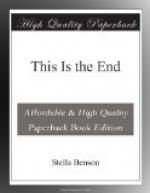Anonyma produced a vignette now, in order to show how necessary it was that she should hurry to her yearning flock.
“I came into the room of one of my sailors’ wives last week, and I found her with a baby sobbing on her breast, and an empty hearth at her feet. I thought of the eternal tragedy of womanhood. I said, ’Will my love help, my dear?’”
There was a pause, and Cousin Gustus sighed.
“What did she say?” asked Kew, without expecting an answer from the artist. After all, a word-vignette is not intended to have a sequel. It is supposed to fall complete with a little splash into your silent understanding. I must say Kew was rather tiresome in refusing to be content with the splash.
“So few women really understand how to stop a child crying,” said Cousin Gustus, speaking from bitter and universal experience.
“That’s the point,” said Kew. “The child had probably swallowed a pin.”
It generally breaks my heart to hear a story spoilt, but with Anonyma’s word-vignettes I did not mind, because they were told as true, and yet they did not ring true. I must tell you that Anonyma had married into a family of accomplished white liars, and to them the ring of truth was as unmistakable as the dinner-bell. Few people could lie successfully to Kew or Jay, they knew that art from the inside. White lies are easily justified, but almost any lie can be whitewashed. Apart from the mutual attitude of Kew and Jay, who possessed something between them that might be called good faith, there was hardly any trust included in that family relationship. Cousin Gustus distrusted youth. He thought young people were always either lying to him or laughing at him, and indeed they often were. Only not so often as he thought. He was no prop on which to repose confidence, and it was very easy both to tell him lies and not to tell him facts.
Mrs. Gustus had no gift of intimacy. She was reserved about everything except herself, or what she believed to be herself. The self that she shared so generously with others was, however, not founded on fact, but modelled on the heroine of all her books. She killed her heroine whenever possible—I think she only once married her,—yet still the creature remained immortal in Mrs. Gustus’s public personality. She concealed or transformed everything that did not seem artistic. Her notebook was a tangle of self-deceptions. The rest of the Family knew this. They never pretended to believe her.
Kew and Jay were skilled romancers, fact was clay in their hands. Nobody had ever taught them such a dull lesson as exact truthfulness. If they built the bare bones of their structures fairly accurately, they placed the whole in an artificial light, altering in some effective way the spirit of the facts. Education had impressed the importance of technical truthfulness on Kew. But he was a quick talker, and in order to keep him in line with his tongue, nature had made him quick of wit, quick in argument, and unconsciously quick in making and seeing loopholes for escape.




